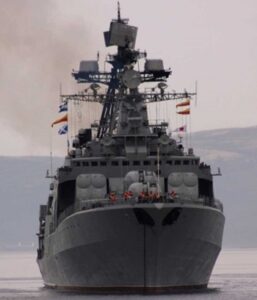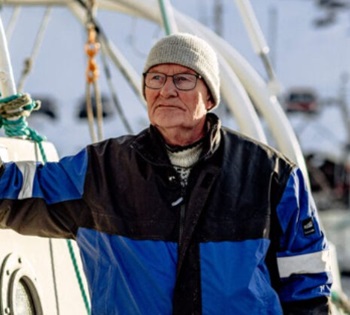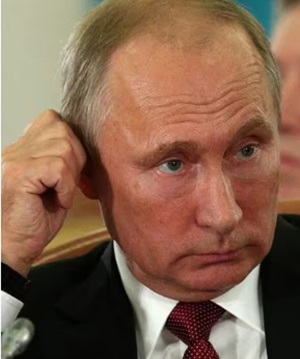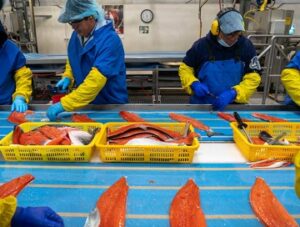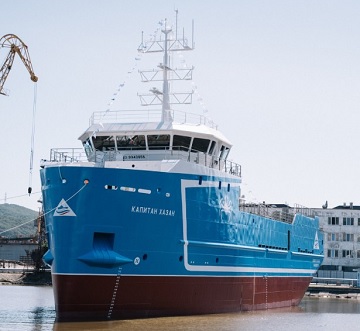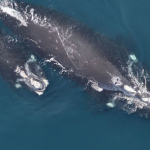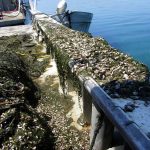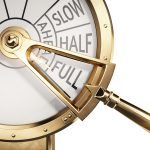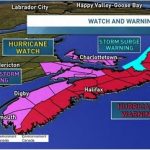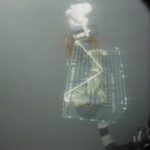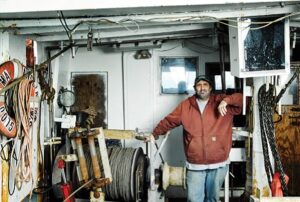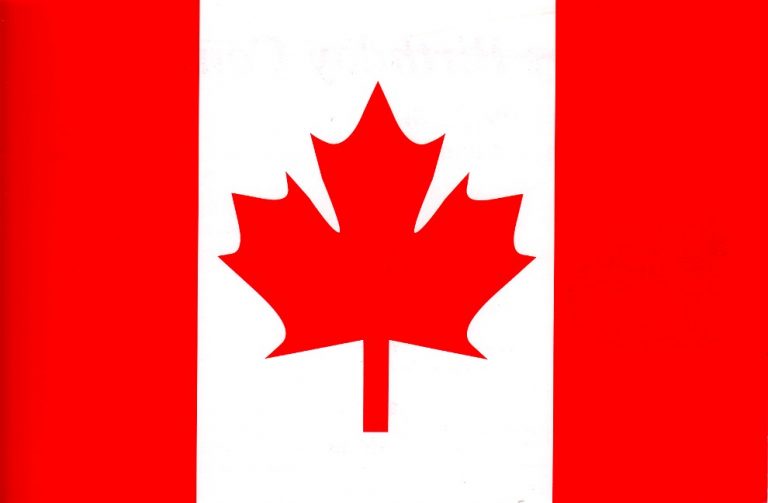Tag Archives: Russia
Russia’s ongoing war on Alaska fishermen
 These are tough times for Alaska’s fishermen, and Russia is a primary cause. During his recent confirmation hearing, Commerce Secretary Howard Lutnick joked with Alaska Sen. Dan Sullivan about the need to counter “communist fish.” In reality, the future of our entire industry could hinge on whether Secretary Lutnick succeeds. For more than a decade, the Kremlin has been implementing policies that take direct aim at Alaska’s fishing sector. In 2014, Russia banned U.S. seafood imports, choking off a $60 million market for Alaska fishermen, with pink salmon roe hit especially hard. In direct response, ex-vessel prices for pink salmon declined from $0.42 per pound to $0.23 per pound in 2015. By Matt Alward. more, >>CLICK TO READ<< 07:18
These are tough times for Alaska’s fishermen, and Russia is a primary cause. During his recent confirmation hearing, Commerce Secretary Howard Lutnick joked with Alaska Sen. Dan Sullivan about the need to counter “communist fish.” In reality, the future of our entire industry could hinge on whether Secretary Lutnick succeeds. For more than a decade, the Kremlin has been implementing policies that take direct aim at Alaska’s fishing sector. In 2014, Russia banned U.S. seafood imports, choking off a $60 million market for Alaska fishermen, with pink salmon roe hit especially hard. In direct response, ex-vessel prices for pink salmon declined from $0.42 per pound to $0.23 per pound in 2015. By Matt Alward. more, >>CLICK TO READ<< 07:18
Russian rescued after 67 days adrift in waters fringing Pacific
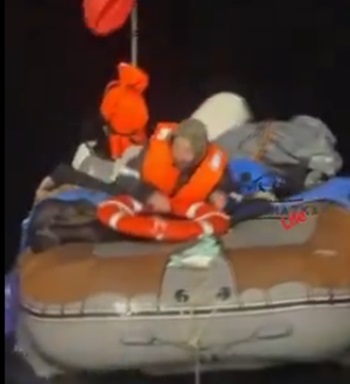 Russian authorities said on Tuesday they had rescued a man whose tiny boat drifted for 67 days since August in waters edging the northwestern Pacific, but his brother and nephew died during the ordeal. Social media images showed a thin, bearded man wearing a hooded jacket and orange emergency vest in a catamaran-like sailboat flying a red flag from a small pole. “On October 14 a vessel was discovered in the waters of the Sea of Okhotsk,” legal authorities in Russia’s Far East said on the Telegram messaging app, referring to waters that sprawl over 1.58-million km². “Two people died, one survived,” said the regional prosecutor’s office charged with handling transport issues. Video, more, >>CLICK TO READ<< 08:15
Russian authorities said on Tuesday they had rescued a man whose tiny boat drifted for 67 days since August in waters edging the northwestern Pacific, but his brother and nephew died during the ordeal. Social media images showed a thin, bearded man wearing a hooded jacket and orange emergency vest in a catamaran-like sailboat flying a red flag from a small pole. “On October 14 a vessel was discovered in the waters of the Sea of Okhotsk,” legal authorities in Russia’s Far East said on the Telegram messaging app, referring to waters that sprawl over 1.58-million km². “Two people died, one survived,” said the regional prosecutor’s office charged with handling transport issues. Video, more, >>CLICK TO READ<< 08:15
Task force report identifies research needs to better understand Alaska salmon problems
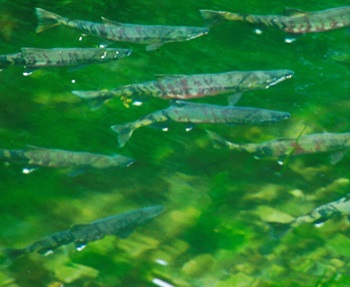 Fishery managers overseeing Alaska’s faltering salmon runs should be able to rely on a more comprehensive and holistic approach to science that considers all habitat, from the middle of the ocean to freshwater spawning streams far inland, according to a task force report on salmon research needs. The report was issued last week by the Alaska Salmon Research Task Force, a group established through a 2022 act of Congress to identify knowledge gaps and research needs. The task force comprises close to 20 members and includes scientists, fishers, Indigenous community representatives and agency managers. In addition to those members, the effort included a special 42-member working group focused on salmon problems in the Yukon and Kuskokwim River drainages. The report follows a year’s worth of meetings and consultations. more, >>CLICK TO READ<< 17:34
Fishery managers overseeing Alaska’s faltering salmon runs should be able to rely on a more comprehensive and holistic approach to science that considers all habitat, from the middle of the ocean to freshwater spawning streams far inland, according to a task force report on salmon research needs. The report was issued last week by the Alaska Salmon Research Task Force, a group established through a 2022 act of Congress to identify knowledge gaps and research needs. The task force comprises close to 20 members and includes scientists, fishers, Indigenous community representatives and agency managers. In addition to those members, the effort included a special 42-member working group focused on salmon problems in the Yukon and Kuskokwim River drainages. The report follows a year’s worth of meetings and consultations. more, >>CLICK TO READ<< 17:34
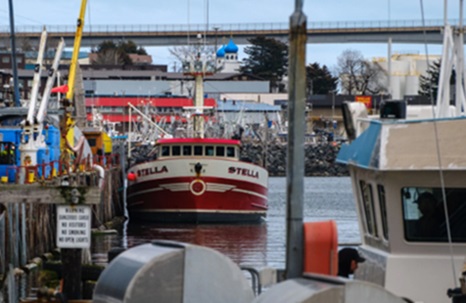
The seafood industry is in trouble. Processors and policy makers blame Russia.
Alaska waters produce the most seafood in the country, and many of the state’s coastal communities depend on commercial fisheries to sustain their economy. But Alaska’s fisheries are facing a massive economic slump right now and policymakers are increasingly blaming flooded global markets. The private sector and federal policymakers are teaming up to try to stop the bleeding. Last year was brutal on the seafood industry. Processing companies and fishermen alike suffered amid cratering prices, and they blamed Russia for flooding markets. Republican U.S. Sen. Dan Sullivan, from Alaska, pointed his finger at the country at a news conference on May 23. “Russians have essentially admitted they’re not just at war in Ukraine, they’re at war with the American fishing industry,” he said. more, >>CLICK TO READ<< 16:03
Rare ‘football fish’ washes up near Cannon Beach
 A deep-sea angler fish, called a Pacific football fish (Himantoliphus sagamius) has been found by local beachcombers just south of Cannon Beach. Living in complete darkness, at 2,000 to 3,300 feet, these fish are rarely seen. In fact, only 31 specimens have been recorded around the world. While a handful of football fish have been recorded in New Zealand, Japan, Russia, Hawaii, Ecuador, Chile and California, this is the first one reported on the Oregon Coast to the knowledge of personnel at Seaside Aquarium, who announced the find. Photos, more, >>CLICK TO READ<< 10:38
A deep-sea angler fish, called a Pacific football fish (Himantoliphus sagamius) has been found by local beachcombers just south of Cannon Beach. Living in complete darkness, at 2,000 to 3,300 feet, these fish are rarely seen. In fact, only 31 specimens have been recorded around the world. While a handful of football fish have been recorded in New Zealand, Japan, Russia, Hawaii, Ecuador, Chile and California, this is the first one reported on the Oregon Coast to the knowledge of personnel at Seaside Aquarium, who announced the find. Photos, more, >>CLICK TO READ<< 10:38
Russians destroyed their trawler “Captain Lobanov” during exercises in the Baltic Sea
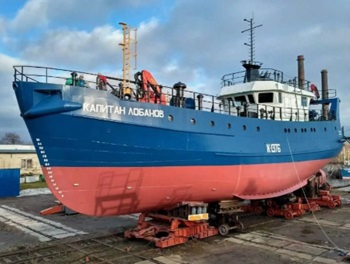 Three crew members were killed and four injured when a Russian missile hit the fishing trawler Kapitan Lobanov during a Baltic Fleet exercise on March 19. The missile that hit the trawler was fired during a Baltic Fleet exercise. Before the incident, the crew members of the Captain Lobanov were about to go to bed when a missile fell on the captain’s cabin. Local authorities say that a fire broke out on board the trawler, and the cause of the incident is still unknown. In addition, the authorities report only one death. Russian media reports that during the March 19 exercise, a Boykoi corvette fired its onboard artillery. more, >>click to read<< 06:43
Three crew members were killed and four injured when a Russian missile hit the fishing trawler Kapitan Lobanov during a Baltic Fleet exercise on March 19. The missile that hit the trawler was fired during a Baltic Fleet exercise. Before the incident, the crew members of the Captain Lobanov were about to go to bed when a missile fell on the captain’s cabin. Local authorities say that a fire broke out on board the trawler, and the cause of the incident is still unknown. In addition, the authorities report only one death. Russian media reports that during the March 19 exercise, a Boykoi corvette fired its onboard artillery. more, >>click to read<< 06:43
Putin launches war on Britain’s fishermen: Russia signs off plan to ban UK trawlers from its cod and haddock-rich waters
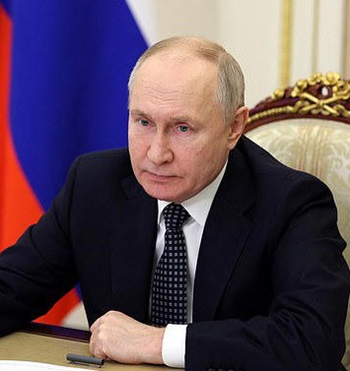 Vladimir Putin today declared a Cod War on Britain as he tore up fishing rights for UK trawlers that have existed since 1956. His compliant parliament ended an agreement signed by the Soviet Union allowing British vessels to fish in the Barents Sea. The move to hit Britain’s fish and chips is revenge for the UK handicapping the Russian economy with sanctions over the war in Ukraine and supplying missiles to Kyiv. It is Putin’s idea to hit at the British, says one of his closest henchmen. The 71-year-old dictator’s warships could now be used against any trawlers seeking to catch cod on Putin’s doorstep. In Moscow, the ploy is seen as a masterstroke personally decreed by Putin, hitting the Brits where it hurts. photos, more, >>click to read<< 16:54
Vladimir Putin today declared a Cod War on Britain as he tore up fishing rights for UK trawlers that have existed since 1956. His compliant parliament ended an agreement signed by the Soviet Union allowing British vessels to fish in the Barents Sea. The move to hit Britain’s fish and chips is revenge for the UK handicapping the Russian economy with sanctions over the war in Ukraine and supplying missiles to Kyiv. It is Putin’s idea to hit at the British, says one of his closest henchmen. The 71-year-old dictator’s warships could now be used against any trawlers seeking to catch cod on Putin’s doorstep. In Moscow, the ploy is seen as a masterstroke personally decreed by Putin, hitting the Brits where it hurts. photos, more, >>click to read<< 16:54
No-farm farm
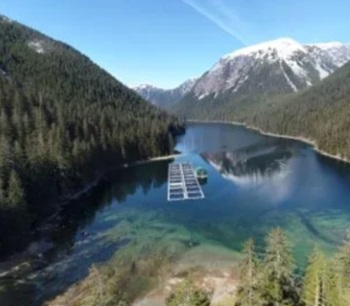 In one of the stranger twists in the strange world of global salmon marketing, Alaska’s non-farm fish farmers played a role in convincing the Canadian city of Ottawa to order removal of billboards protesting farmed salmon. The reason? “False advertising.” And now the same environmental group involved in Ottawa – Wild First – is under fire in British Columbia for running radio advertisements claiming salmon farms have pushed wild Pacific salmon to “the brink of extinction,” according to the news website Business in Vancouver (BIV). That claim is about as far from the truth as one can get. Salmon in the Pacific are today at numbers never seen in recorded history, but most of them are pink salmon. Some scientists contend this explosion of pinks due in part to the free-range fish farming efforts of hatchery operators in Alaska and Russia has reached the point where it is wreaking havoc with the entire North Pacific ecosystem. more, >>click to read<< 07:50
In one of the stranger twists in the strange world of global salmon marketing, Alaska’s non-farm fish farmers played a role in convincing the Canadian city of Ottawa to order removal of billboards protesting farmed salmon. The reason? “False advertising.” And now the same environmental group involved in Ottawa – Wild First – is under fire in British Columbia for running radio advertisements claiming salmon farms have pushed wild Pacific salmon to “the brink of extinction,” according to the news website Business in Vancouver (BIV). That claim is about as far from the truth as one can get. Salmon in the Pacific are today at numbers never seen in recorded history, but most of them are pink salmon. Some scientists contend this explosion of pinks due in part to the free-range fish farming efforts of hatchery operators in Alaska and Russia has reached the point where it is wreaking havoc with the entire North Pacific ecosystem. more, >>click to read<< 07:50
Swimming Against the Tide
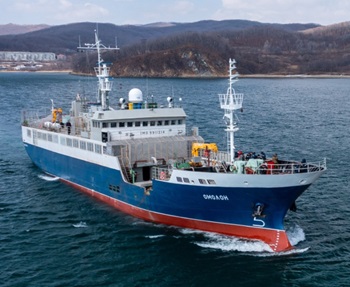 Russian Crab and Antey, two prominent Russian crab-catching companies, signed an agreement with a Russian government agency to invest 224 billion roubles ($2.3 billion) to build 18 crabbers in the next few years and expand the Far East’s coastal processing infrastructure. Under the agreements signed during the Vladivostok Economic Forum, Antey intends to build eight crabbers and launch two port complexes housing fish processing infrastructure. Russian Crab plans to add ten new vessels to its fleet. Russian crab currently runs a fleet of 37 vessels, Antey has 52 in operation. Both companies participated in the first round of the crab auctions. Photos, more, >>click to read<< 09:01
Russian Crab and Antey, two prominent Russian crab-catching companies, signed an agreement with a Russian government agency to invest 224 billion roubles ($2.3 billion) to build 18 crabbers in the next few years and expand the Far East’s coastal processing infrastructure. Under the agreements signed during the Vladivostok Economic Forum, Antey intends to build eight crabbers and launch two port complexes housing fish processing infrastructure. Russian Crab plans to add ten new vessels to its fleet. Russian crab currently runs a fleet of 37 vessels, Antey has 52 in operation. Both companies participated in the first round of the crab auctions. Photos, more, >>click to read<< 09:01
Vessel Review: Kapitan Sokolov
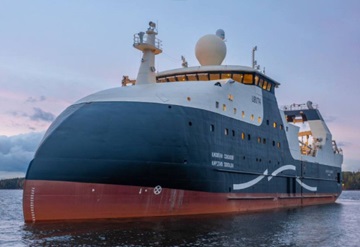 Russia’s United Shipbuilding Corporation, through its Severnaya Verf facilities in Saint Petersburg, has completed construction on a new freezer trawler ordered by local seafood company the Norebo Group. Kapitan Sokolov is the first of six Project 170701 freezer trawlers to be ordered by Norebo from Severnaya Verf. It has a steel hull, a length of 81.6 metres, a beam of 16 metres, a displacement of 5,500 tonnes, a hold capacity of nearly 1,500 tonnes of assorted fish products including fish meal and canned fish, and space for 80 crewmembers and fish processing personnel. >>click to read<< 08:34
Russia’s United Shipbuilding Corporation, through its Severnaya Verf facilities in Saint Petersburg, has completed construction on a new freezer trawler ordered by local seafood company the Norebo Group. Kapitan Sokolov is the first of six Project 170701 freezer trawlers to be ordered by Norebo from Severnaya Verf. It has a steel hull, a length of 81.6 metres, a beam of 16 metres, a displacement of 5,500 tonnes, a hold capacity of nearly 1,500 tonnes of assorted fish products including fish meal and canned fish, and space for 80 crewmembers and fish processing personnel. >>click to read<< 08:34
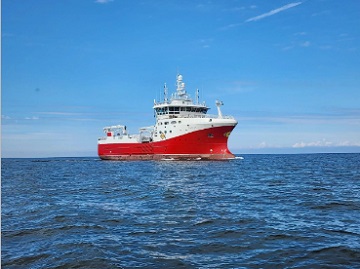
Crab catching ship Vaigach of Project КСП01 built by Krasnoye Sormovo completed sea trials
Krasnoye Sormovo PJSC (a company of United Shipbuilding Corporation) says it has completed the trial of crab catching ship of Project КСП01, Vaigach. The trials were held near the Gogland island in the Gulf of Finland. The test programme included checking of the vessel’s propulsion system, its performance, automation/communication/navigation systems, as well as all equipment installed on the crab-processor. The tests were carried out with the participation of specialists from Krasnoye Sormovo shipyard’s commissioning team in the presence of representatives of the customer, contractors and RS. >click to read< 15:06

Seafood legislation would ban import of Russian-origin seafood products
Legislation introduced in the U.S. House and Senate this week would impose a ban on the import of all Russian-origin seafood products still making their way into the United States. An executive order signed in March of 2022 by President Biden prohibited the import of unaltered seafood originating in Russia. That order did not, however, block Russian seafood that has been substantially changed through reprocessing in another country. The U.S.-Russian Federation Seafood Reciprocity Act of 2023 was introduced by Sens. Lisa Murkowski and Dan Sullivan, both R-Alaska. Companion legislation was introduced in the House by Reps. Mary Sattler Peltola, D-Alaska, and Garret Graves, R-LA. >click to read< 10:20
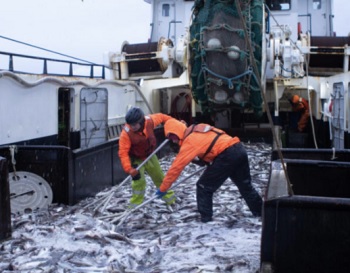
Tons of fish caught in Russia is sold in America, despite import ban
President Joe Biden signed an import ban on Russian seafood last year, but fish valued at several hundred millions of dollars are able to evade the ban by diverting to another another country before arriving on American shores. “There has been a huge loophole where the Russians have been now sending their fish – it’s pollock, it’s salmon, a little bit less crab – to other countries for reprocessing, primarily China,” U.S. Sen. Dan Sullivan told reporters Thursday. The ban was intended to ensure Americans aren’t indirectly financing Russia’s war on Ukraine through their purchases. >click to read< 11:07
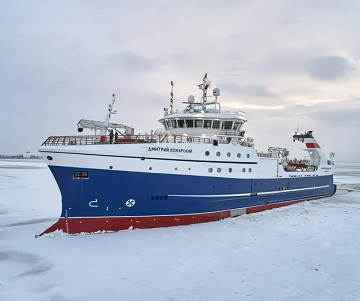
Vyborg Shipyard is building trawlers under investment quotas programme
Vyborg Shipyard will build three trawlers of KMT02 design for the companies of FOR Group. The Dmitry Kozharsky trawler is the first large factory freezer trawler in the series intended for bottom trawling. The ship laid down on 1 November 2018 was launched on 19 June 2020. The Ice3 trawler with a hull of Arc4 is intended for bottom trawling with further processing and freezing the fish on board. The equipment freezing capacity is up to 105 tonnes of fish per day. The holds capacity is 2,375 cbm. 5 photos, >click to read< 21:45
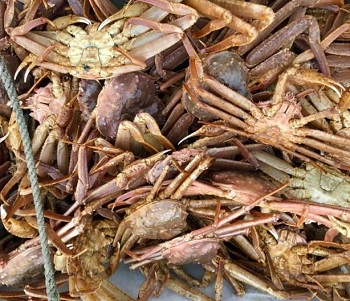
“We’re solid. We’re unified” – Inside Kodiak’s crab standoff
The nearly 6-million-pound quota was the highest in decades. And some people spent more than $100,000 to buy a permit to fish this year, said Kevin Abena, one of the leaders of the Kodiak Crab Alliance Cooperative. But fishermen’s hopes for a banner season are now in limbo, as the 130 boats in the Kodiak tanner crab fleet are on strike, holding out for higher prices from the seafood processors that typically buy, package and resell their catch. But processors and industry experts say the fishermen are fighting larger market forces that make it unlikely they’ll get much more than the $3.25 a pound that Kodiak-based plants have already offered, less than half than last year’s $8 a pound price. >click to read< 10:48
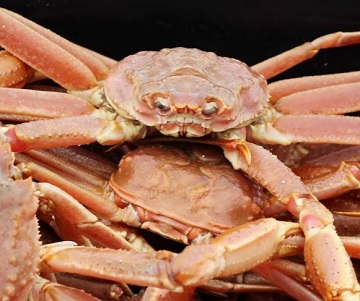
N.L. snow crab sales to Japan displaced by Russia
While many countries are imposing sanctions on Russia as a result of the war in Ukraine, Japan is taking advantage of low Russian snow crab prices. Clifford Small, MP for Coast of Bays-Central-Notre Dame and federal fisheries critic, says that is preventing Newfoundland and Labrador processors from selling their crab to Japan, as they normally do. “To have one of our major markets dry up on us, and to dry up in a sense that basically they started buying from a country like Russia — that’s at war in Ukraine — flies in the face of what you’d expect from a great trading partner and an ally,” he said. >click to read< 15:44
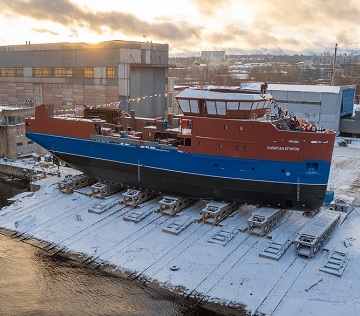
Russian Crab Renews Fleet
One of Russia’s big players, Russian Crab, is in the process of renewing its fleet of elderly vessels with new tonnage, and the first of these new crab catchers have been floated off for outfitting. The company is building both vivier crabbers at the Onega Shipyard, while processor vessels are taking shape at the Okskaya Sudoverf JSC shipyard. Vivier crabber Kapitan Egorov was launched at Onega in Petrozavodsk at the end of last year,,, These CCa 5712LS series vessels are designed to work under the challenging conditions of the Bering Sea, the Sea of Okhotsk and the Sea of Japan, and are being outfitted with systems that are new to the Russian fishing sector, with circulation systems to keep crab in prime condition. These come with monitoring systems for temperature, air volume in the tanks and the oxygen content of the water, with data transferred automatically to the wheelhouse and to the office ashore. Photos, Video, >click to read< 20:10
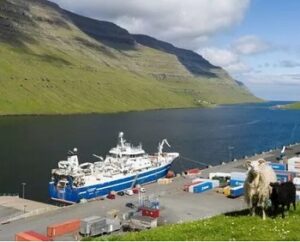
Anger as Faroe Islands renew fishery agreement with Russia
The Faroese granted Moscow the right to catch tens of thousands of tons of blue whiting in a special area shared with Britain despite the war in Ukraine. Ian Gatt, chief executive of the Scottish Pelagic Fishermen’s Association, said: “It is hugely disappointing, if not surprising, that Faroe has concluded a fisheries agreement for 2023 with Russia. The fishing industry spent months calling on the Government to pressure the island country – 200 miles north of Scotland – to maximise damage to Vladimir Putin’s war machine by banning his trawlers. >click to read< 09:12
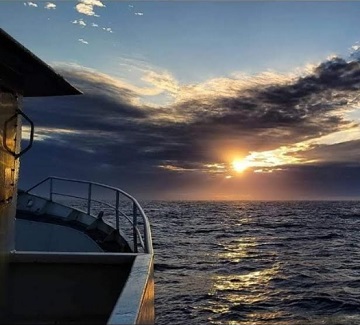
Jerry Leeman: Fishing is my life. Somewhere, people forgot to listen to the generations before us.
I’ve spent all my life on the ocean. My family and friends are fishermen and lobstermen. I grew up on an island in Maine and almost everyone was in some form of fishery, whether it be groundfishing, gill netting, seining and lobstering. We even had shrimping till that was mis managed away. I grew up watching these men and women harvesting the ocean. Rules were put into place to harvest the ocean responsibly and sustainably for future generations. Most people in this nation know little to as of why our fish stocks became depleted. Other nations like Russia and other European super trawlers were allowed to pillage our waters along the New England coast. They were eventually banned, but the destruction had been done. We’ve spent years restricting ourselves fishing, going out of our way bending backwards to rebuild our fish stocks. >click to read< By Jerry Leeman 11:19
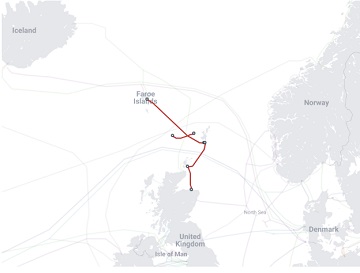
Fiber-optic Submarine Cable near Faroe and Shetland Islands Damaged; Mediterranean Cables also Cut
Last week the SHEFA-2 undersea cable linking the Faroe Islands to mainland Scotland via the Shetland and Orkney Islands was damaged in two separate incidents leaving much of the islands without internet connection. In the south of France three key subsea cables connecting the city of Marseille to Lyon, Milan, and Barcelona were purposely cut, the cable’s operator reported, impacting internet connectivity worldwide. While French authorities suspect an act of sabotage, their Scottish counterparts remain more cautious about what caused the damage to the cables. Similar to the Svalbard cable incidents, in which Russian fishing vessels passed repeatedly over the areas where the cables were located, police investigating the Faroe and Shetland incidents suggested that it was likely fishing vessels, which damaged the cables. >click to read< 09:19
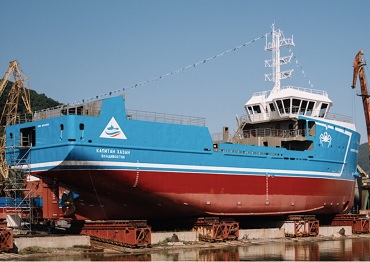
Stepping up Crabber Fleet Renewal
The first crabber in a series of eight has been floated off at the Nakhodka Shipyard for Russian fishing giant Antey. The company hopes the new vessel will be an improvement than the one it took delivery of from Pella Shipyard. F/V Kapitan Khazan is designed for catching crab in the waters of the Bering, Barents and Okhotsk seas and has a carrying capacity of up to 120 tonnes of live crab in nine tanks with a total volume of 680m3. ‘We placed an order at the Nakhodka shipyard, one of the oldest plants in Primorye. It is important for us not only to renew the fleet and create comfortable conditions for seafarers but also to revive the traditionally strong shipbuilding industry in the Far East,’ Antey’s president Ivan Mikhnov said in a statement. Photos, >click to read< 11:10
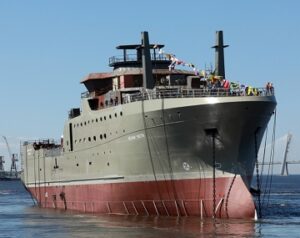
Russian fishing trawler “Mekhanik Maslak” catches fire in St Petersburg shipyard
The Russian fishing trawler “Mekhanik Maslak,” caught fire while reportedly under construction at the Admiralty Shipyards in St Petersburg. The fire covered more than 800 square metres of the hold. Footage of the incident was shared on Twitter, with one user posting, “The Mekhanik Maslak, a fishing trawler under construction, has caught fire at the Admiralty Shipyards in St Petersburg. The fire is being extinguished from both shore and water.” short videos, >click to read/watch< 16:34
Fire ignites on factory trawler under construction in Saint Petersburg, Russia – Russian media reports that a fire broke out on a large fishing vessel still under construction at a shipyard in the city of Saint Petersburg on Tuesday, August 2. >click to read<
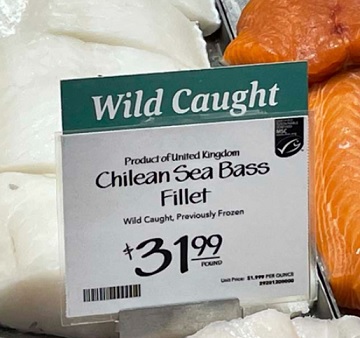
Fishing feud at end of the world split US and Britain over Russia
It’s one of the world’s highest-fetching wild-caught fish, sold for $32 a pound at Whole Foods and served up as meaty fillets on the menus of upscale eateries across the US. But Russia’s obstruction of longstanding conservation efforts, resulting in a unilateral rejection of catch limits for the Chilean sea bass in a protected region near Antarctica, has triggered a fish fight at the bottom of the world, one dividing longtime allies, the US and UK governments. >click to read< 11:16
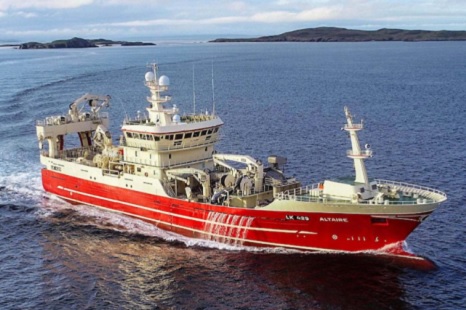
‘Boris, where’s your Russian sanctions?’ asks F/V Altaire’s First Mate
The first mate of local pelagic trawler F/V Altaire has written to prime minister Boris Johnson urging the UK Government to act over Russian factory ships fishing for blue whiting in UK waters around 100 miles to the west of Shetland. Colin Leask said there were 11 Russian vessels presently in the UK’s shared zone with the Faroe Islands fishing for a “ridiculously inflated” quota of 75,000 tonnes of blue whiting. The crewman’s appeal is the latest attempt by the industry to get the government to close a loophole that enables Russian vessels to fish inside UK waters at a time of “supposedly strict sanctions” against the country in response to the invasion of Ukraine. >click to read< 16:50
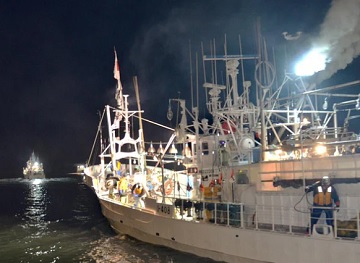
Amid tensions over Ukraine, Russia and Japan seal deal on fishing quotas
Japan and Russia have reached an agreement over Tokyo’s annual catch quota for Russian-born salmon and trout, the Japanese Fisheries Agency said Saturday, despite delays and chilled relations between the two sides amid Russia’s invasion of Ukraine. The agreement on Japan’s quota for the popular fish in waters near disputed islands north of Hokkaido is a relief for Japanese fishermen who were worried about the prospects amid worsening ties between the two governments. >click to read< 08:42






